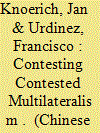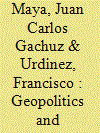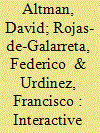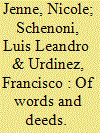|
|
|
Sort Order |
|
|
|
Items / Page
|
|
|
|
|
|
|
| Srl | Item |
| 1 |
ID:
168165


|
|
|
|
|
| Summary/Abstract |
This study examines why a large number of Western advanced economies joined the China-led Asian Infrastructure Investment Bank (AIIB) in 2015 despite the bank’s purported challenge to the Western-centred international order in the area of multilateral development finance. Through a mixed-method examination involving elite interviews, analyses of government pronouncements and regressions, and by drawing on concepts from rational choice theory, international policy diffusion, and rational design of international institutions, this study finds that the AIIB’s success with regard to its large membership is due to China’s effective creation of a demand for the organization among Western advanced economies. We argue that policymakers in Western countries enjoyed ‘induced agency’, which China granted them in the process of creating the organization and deciding about its membership. First, Western advanced economies had agency because their involvement was needed to prevent the AIIB from becoming a homogenous small organization consisting of Asian debtor countries in favour of a global organization with a heterogeneous group of both debtor and creditor country members. The AIIB was thus set up to accommodate the specific economic and political goals of Western advanced economies. Secondly, Western advanced economies experienced agency in the process of deciding about their membership in the bank because China proactively courted them to join the AIIB. China moreover endorsed the spontaneous intensification of communications that ensued among Western advanced economies with regard to joining the AIIB. Both efforts ultimately resulted in diffusion among them of the decision to become members. Thirdly, the Western advanced economies were granted agency in the process of determining the AIIB’s organizational design, thus allowing them to converge the initially diverse visions for the institutional design of the bank and shift it from contesting the existing system of multilateral development banks to effectively integrating into it. Our study thus advances a theory of country-specific demand for membership in an international organization.
|
|
|
|
|
|
|
|
|
|
|
|
|
|
|
|
| 2 |
ID:
187152


|
|
|
|
|
| Summary/Abstract |
The Bretton Woods institutions have failed to accommodate a rising China, and many authors describe this moment as a crisis of the liberal order, which China is intentionally contesting. The World Trade Organization was incapable of offering a solution to the trade war, and more recently, the World Health Organization was incapable of reducing – and rather partly contributed to – tensions between the US and China in the management of COVID-19 crisis. This Special Issue is made up of six manuscripts that address the most sensitive issues of the China–Latin American relationship amid the challenges of the growing dispute with the United States. The manuscripts assess the four main concerns that are shaping the agenda in China–Latin American relations in times of increasing geopolitical and geoeconomic competition between the United States and China: the Belt and Road Initiative, the One-China policy, the trade war, and the COVID-19 crisis.
|
|
|
|
|
|
|
|
|
|
|
|
|
|
|
|
| 3 |
ID:
178716


|
|
|
|
|
| Summary/Abstract |
Democracies do not take up arms against each other. Although this axiom has attained the status of a mantra in the field of international relations, this statement is much more complex than it appears, in part because it is highly contingent on the definitions and operationalizations of both democracy and conflict. This article revisits democratic peace theory, combining both institutional constraints and similarity-based arguments. Interactions between the democratic level of the dyad (the average democratic level of its members) and its democratic spread (difference between the democratic scores of its members) create a dyadic triangle that encompasses all possible combinations of cases, revisiting which dyads are more prone to conflict. The findings partially confirm and partially refute both the institutional constraints and the similarity-based arguments, leading to a nuanced alternative theory: the Interactive Model of Democratic Peace. Akin to democratic peace theory, our evidence shows that the higher a dyad’s level of democracy is, the lower the probability of fatal militarized interstate disputes between that pair of states. However, contrary to democratic peace theory, we find that dissimilar-regime dyads can still be peaceful as long as they have a high mean of democracy. Following the theory of regime similarity, we consider the democratic spread of each dyad, but we find that being similar is not a sufficient condition for peace between the members of a dyad. From the empirical evidence, the article derives three heuristic zones of conflict, filling much of the gray area that has been left unexplained by previous models.
|
|
|
|
|
|
|
|
|
|
|
|
|
|
|
|
| 4 |
ID:
157531


|
|
|
|
|
| Summary/Abstract |
The idea of an integrated Latin American region goes back to the early post-independence period, and yet, in substance, Latin American regionalism has remained far behind its stated aims. The perceived implementation gap has raised the question why policymakers continued to talk about something they appeared to avoid in practice. This article contributes to the debate on Latin America’s integration gap by exploring the phenomenon of declaratory regionalism - the practice of referring to the region and its institutions in political speeches. Based on quantitative text analysis of the speeches presidents delivered annually at the UN’s General Assembly between 1994 and 2014, we show that this practice has not been uniform. Presidents distinguish between different forms of regionalism, integration and cooperation, and frame the geographical region they refer to accordingly. In motivating presidents to speak about integration as opposed to cooperation, ideology and democratic performance stand out as crucial factors.
|
|
|
|
|
|
|
|
|
|
|
|
|
|
|
|
|
|
|
|
|